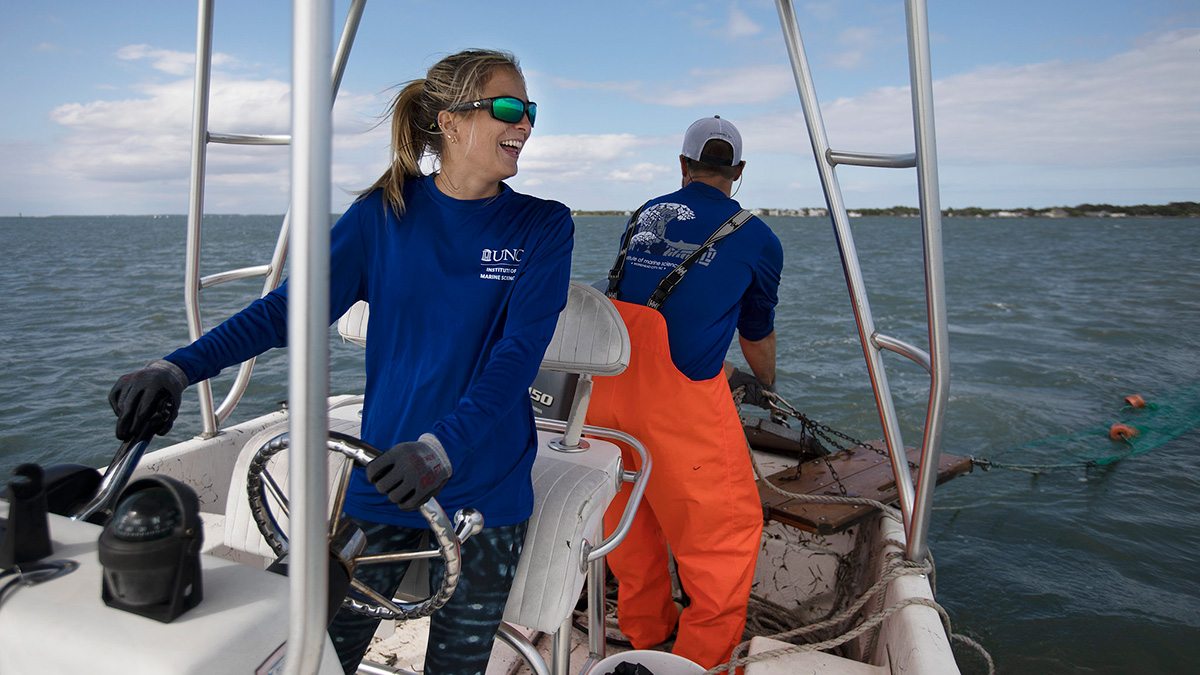Warming waters and North Carolina’s fisheries
Alongside Associate Professor Janet Nye at the UNC Institute of Marine Sciences, graduate student Sally Dowd is working toward a better understanding of how ocean warming affects fish populations in coastal regions and the broader implications of these changes.

Sally Dowd fell in love with the ocean and the creatures that call North Carolina’s coastal waters home during family trips to Wilmington as a kid.
As an adult, she’s turned that passion into a career, majoring in environmental biology at the University of California, Berkeley, and researching sharks and coral reefs.
Dowd is returning her attention back to North Carolina’s waters as an ecology doctoral student to study challenges that could leave a lasting impact on fish, fisheries and communities. Alongside Associate Professor Janet Nye at the UNC Institute of Marine Sciences, Dowd is working toward a better understanding of how ocean warming affects fish populations in coastal regions and the broader implications of these changes.
“I’m interested in fisheries ecology and management and the connection between what’s happening in the ocean to what’s happening with people,” Dowd said
From Berkeley to Morehead City
Despite her passion for the ocean, Dowd didn’t initially expect to spend a career studying it. When she arrived in California to start her undergraduate program in 2016, she planned to study journalism. But through internships around the world, Dowd found her footing in marine science and environmental biology.
“The start of my research was mainly shark fieldwork, so I was tagging sharks in the field,” she said. “I then researched coral reefs by examining bacteria in nearby waters and conducting population surveys when I was in French Polynesia.”
Dowd found her research path during a summer fellowship at the Woods Hole Oceanographic Institution in Massachusetts.
“I was in the policy department, and I was working on a fisheries economics project,” she said. “I started to see how you can easily connect economics with ecology, and it really made me interested in research that can inform policy.”
Instead of heading directly to graduate school after graduating in 2020, Dowd took a position as a temporary research technician at the UNC Institute of Marine Sciences, an off-campus teaching and research laboratory in Morehead City, North Carolina. She worked in Nye’s lab, assisting in research on fish populations and coastal ecosystems to understand how changes in the environment impact fish. Dowd began by spending hours in the water catching various fish.
“The idea is to collect data to figure out the thresholds of coastal fishes in North Carolina and then apply that within a model to see where fish are going to be as the climate keeps changing to establish their lower and upper thermal limits,” she said.
Dowd’s work evolved to using computer software to examine marine heatwave trends and what spikes in temperature could mean for the human communities that rely on fish.
A year inland
The work at IMS solidified her goal of returning to school to lead her own research.
“IMS is a remote campus on the coast, and it really pushes you and gives you the resources that you need to go forward,” Dowd said. “I am glad that I didn’t rush into grad school. I had a year and a half of being exposed to a lot of different work. I was able to explore my interests more, and I really liked the work I was doing. I think it set me up for grad school in a good way.”
Those connections with the Nye Lab and other researchers at IMS made the decision to pursue a Ph.D. at Carolina an easy one. Dowd began her doctoral program this fall and will spend this academic year studying in Chapel Hill before returning to IMS.
She plans to continue her work on fisheries and ecology as a graduate student and is looking forward to tapping into the College of Arts and Sciences’ Environment, Ecology and Energy program interdisciplinary approach to conduct research that furthers environmental and human well-being in a changing climate.
“I have always wanted to do applied research,” she said. “I want to be doing research that can impact the environment and humans in a positive way.”




